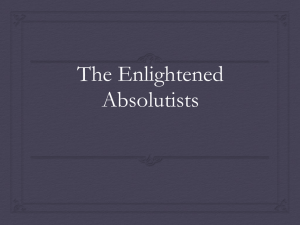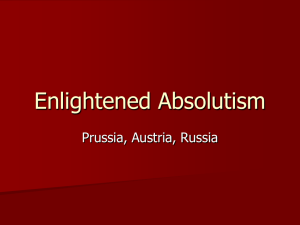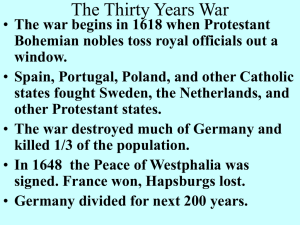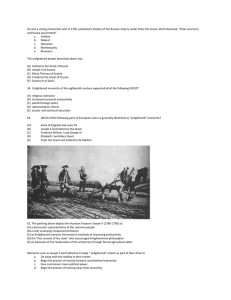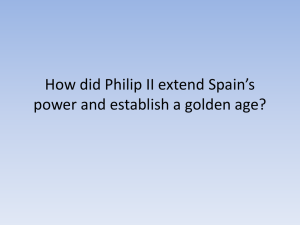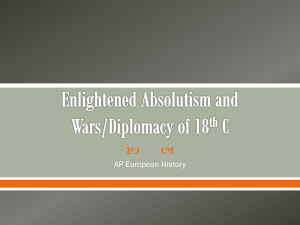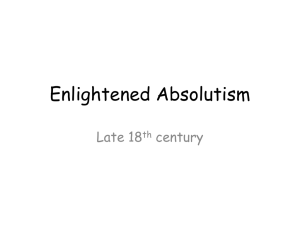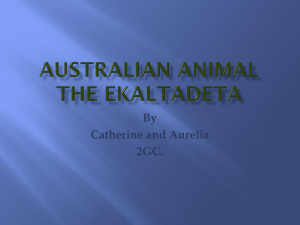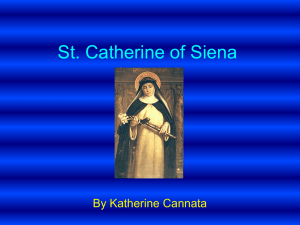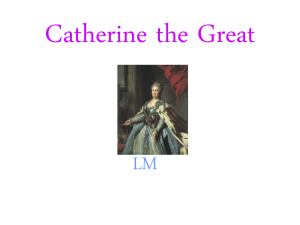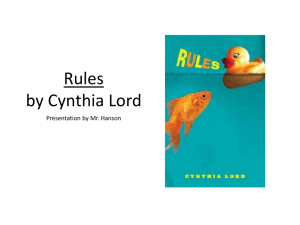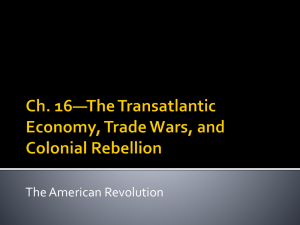unit #5 : enlightened despots
advertisement
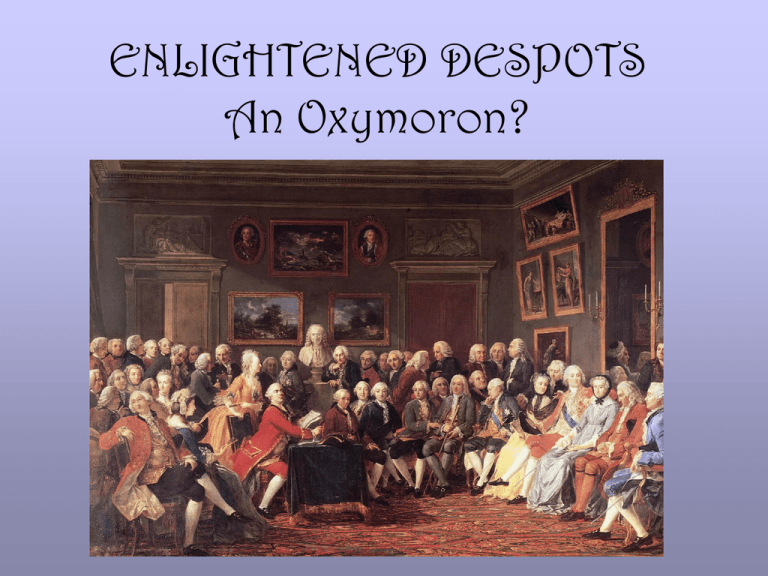
ENLIGHTENED DESPOTS An Oxymoron? Enlightened Despots ENLIGHTENED DESPOTISM: An__absolute____ rule which favored religious ____toleration______, economic and legal reforms, and justified the right to hold power by usefulness to society rather than by __divine right___ NOT IN FRANCE LOUIS XV Louis was hostile to the philosophes and _banned__ their writings. He considered himself an absolute monarch ruling by divine right. His ineffectual rule, involvement in costly wars, imposition of unpopular __ taxes__ , loss of much of France's overseas empire, and affairs with Madame du Pompadour and Madame du Barry made him personally unpopular and paved the way for the _French Revolution___ of 1789. PRUSSIA FREDERICK II (THE GREAT) A. Preferences: He liked music and witty conversation. He studied philosophy, played the flute, wrote poetry, and corresponded with famous intellectuals, most notably____Voltaire______ . His opinions were humane and liberal but his actions were not. Remember, he started the War of the Austrian Succession in 1740. PRUSSIA FREDERICK II (THE GREAT) B. Voltaire Connection: He wrote letters to Voltaire who came to stay at his court at Sans Souci near Potsdam from 1750-53. The initial enchantment ended and they became enemies. PRUSSIA FREDERICK II (THE GREAT) C. Reforms: 1. Abolished the use of torture, except for crimes such as murder and treason. 2. He permitted some freedom of speech and press. 3. He decreed broad religious toleration 4. He improved Prussia's judicial system by establishing impartial and efficient court procedures. PRUSSIA FREDERICK II (THE GREAT) 5. He reorganized existing ___laws_ into a single code. 6. He reorganized the Prussian economy along mercantilist lines, promoting metallurgy and textile industries 7. He introducing scientific methods of cattle breeding and crop __rotation____ from western Europe. He fostered the planting of soil-enriching clover and fodder crops as well as inexpensive foods such as turnips and ___potatoes__.He also drained swamps, initiated reforestation projects. PRUSSIA FREDERICK II (THE GREAT) D. Negatives: 1. He was less progressive in social reform and defended traditional distinctions of rank and privilege 2. He relieved the burdens of __serfs____ who lived on his own lands but did little to ameliorate the lot of serfs tied to the private estates of the aristocracy, or Junkers. PRUSSIA FREDERICK II (THE GREAT) E. Final Analysis: He was a tireless worker, beginning each day at 6 am and personally overseeing all governmental business. He considered himself the "first servant of the state". When he died on Aug. 17, 1786, Prussia's population was approaching 6,000,000 and its army numbered 200,000 men. He left his successor, FREDERICK WILLIAM II, a full treasury and a smoothly operating, disciplined bureaucracy. RUSSIA CATHERINE II (THE GREAT) A. Grand Duke Peter: He was the _heir____ to the Russian throne whom Catherine__married__ in 1744. He was mentally deficient, playing with toy soldiers and torturing dogs and cats. Empress Elizabeth (daughter of Peter the Great) died on Dec. 25, 1761, and Catherine's husband succeeded as PETER III. The new ruler was unpopular with the army and was overthrown in June, 1762 in a coup led by the brother of Catherine's lover. Peter was subsequently __deposed___ and Catherine became absolute ruler. RUSSIA CATHERINE II (THE GREAT) B. Carrying on the Dream: Imbued with the ideas of the Enlightenment, she was a __patron__ of writers and wrote letters to _Voltaire__ She aimed at completing the job started by Peter I -- _westernizing____ Russia. She succeeded to a degree with the upper classes, but did nothing for the overwhelming majority of the population--the enserfed peasantry RUSSIA CATHERINE II (THE GREAT) C. Pugachev Rebellion: This 1773 event was an uprising of peasants, serfs, Cossacks (mercenaries), and escaped prisoners led by Yemelian Pugachev who claimed to be the dead Peter III come back to life. The revolt was ruthlessly crushed by the army in 1775. Catherine put away any thoughts of ending serfdom and gave the nobles absolute control over the serfs. RUSSIA CATHERINE II (THE GREAT) D. Reforms: 1. Catherine encouraged the modernization of agriculture and industry. 2. She promoted trade and the development of underpopulated regions by inviting foreign settlers. She founded new towns. 3. She permitted the establishment of private printing presses and relaxed censorship rules. 4. She promoted education, increasing the number of state and private __schools__ . RUSSIA CATHERINE II (THE GREAT) E. Expansion of the Russian Empire 1. Following two successful wars against Turkey (the RUSSO-TURKISH WARS of 1768-74 and 1787- 92, Russia secured the Crimea and thus realized a centuries-old dream of establishing itself on the north shore of the ___Black__ Sea. 2. The fertile lands of the Ukraine were also opened for settlement and soon became the granary of Europe. EXPANSION OF RUSSIA, 1689–1796 The overriding territorial aim of the two most powerful Russian monarchs of the 18th century, Peter the Great (in the first quarter of the century) and Catherine the Great (in the last half of the century) was to secure navigable outlets to the sea in both the north and the south for Russia’s vast empire; hence Peter’s push to the Baltic Sea and Catherine’s to the Black Sea. Russia also expanded into Central Asia and Siberia during this time period. RUSSIA CATHERINE II (THE GREAT) 3. Catherine also participated in the partitions of Poland (1772, 1792, and 1795), with Frederick the Great bringing a large part of that country under Russian rule. With the last partition in 1795, _Poland___ ceased to exist as an independent country and would not re-appear until after___World War I___ . (1918) AUSTRIA MARIA THERESA • Maria Theresa (1740 – 1780) Archduchess of __Austria__, queen of __Hungary___ and __Bohemia_, and wife of Holy Roman Emperor, Francis I. She and her husband had ten children who survived to adulthood including Marie Antoinette, future queen of __France__. • She came to the throne by virtue of her father, __Charles VI’s___ promulgation of the ___Pragmatic Sanction___. • The War of __Austrian Succession___ immediately followed her accession to the throne. AUSTRIA MARIA THERESA AND JOSEPH II 1. Reforms: Maria Theresa carried out many internal reforms with the aid of her minister _Wenzel Anton von Kaunitz__. a. Began the centralization of the state administration. b. Began the reduction of the powers and privileges of the nobility. c. Subordinated the church to the authority of the state. d. Abolished the tax exemptions of both the nobility and church. e. Initiated agrarian and educational reforms and a system of relief for the poor. AUSTRIA MARIA THERESA AND JOSEPH II 2. Beliefs: In her actions she upheld the interests of the monarchy. She was intolerant of both Judaism and Calvinism. She disliked Enlightenment ideas but her son, Joseph, became enamored of them. AUSTRIA JOSEPH II (co-emperor 1765 when Francis I died; inherited crowns of Bohemia and Hungary in 1780 when _Maria Theresa_ died. Ruled until his death in 1790) 1. Reforms: a. Continued centralization of administration and reduced the influence of provincial diets and the special privileges of the aristocracy b. Abolished serfdom AUSTRIA JOSEPH II c. Established freedom of the press d. Eliminated torture and the death penalty e. attempted to establish equality before the law f. Introduced a single tax based on land. g. Granted official toleration to Protestants and Jews; dissolved the monasteries of contemplative Catholic orders h. Decreed the use of German governmental business throughout his domains. AUSTRIA JOSEPH II 2. Beliefs a. Strove to enhance the power of his state and the welfare of his subjects. b. Dominated by a desire for reason and order, Joseph was intolerant of opposition. He created a secret police and employed military force to implement the thousands of laws and edicts he issued.
